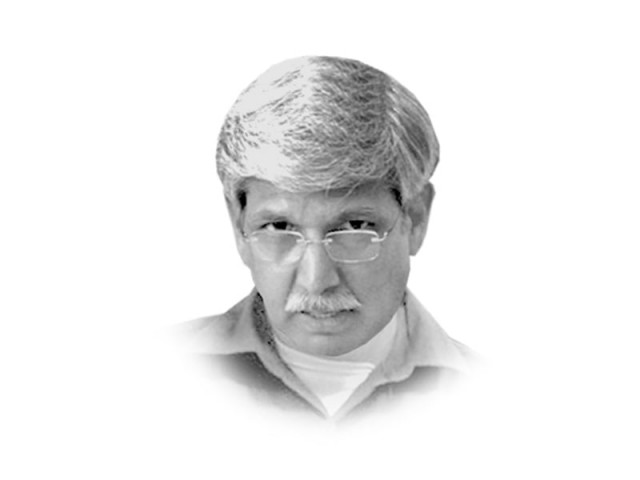The APC of politics
Dialogue as the consensual representative will must be given its due share of time to play itself out.

The writer is a defence analyst who retired as an air vice-marshal in the Pakistan Air Force
The more recent ones have been to develop an agreed line of action on extricating from the ongoing war against terrorism; or even more pertinently, seeking peace, even as the length and breadth of this country increasingly gets engulfed in an expanding fire. Despite these APCs, why isn’t the country yet out of the enflaming inferno? That needs an anatomical approach to the process. But before we get there, what is this fetish with APCs in Pakistani politics?
Here are a few other related contexts: President Obama, under his country’s War Powers Act, can without any reference, order his military into war and only get back to the Congress within 90 days for a post-facto authorisation. All his recent predecessors have with abandon partaken of this constitutional facility and thrown America’s military machine into war in the far corners of the world in the name of democracy and human rights. Yet, as he approaches that crucial decision to launch a military riposte in Syria, he finds himself hamstrung minus any support of even a contrived coalition, what to mention a popular coalition or a coalition of the willing.
What does Obama do when he finds himself divested of his usual support? He seeks congressional support by referring the decision to invoke military action to its combined wisdom. The difficulty: its combined wisdom is unlikely to be anything wise, instead driven more by domestic political dynamics and political divide. Obama’s own party, too, may rebuff him on this issue. Attack Syria, he will, but that will only magnify his own predicament because having ceded his own power to the Congress as an expedience, he will now wrest it back only at a significant political cost. A nation’s military would have thus entered war in the face of universal opposition to it at home and abroad. If indeed, this is how it materialises for America, it will place the American political system into serious dysfunction with a serious threat of unraveling. And all because the executive chose to give up its responsibility to execute. Call it the ‘Great Escape’.
Here is another: when the DCC was recently converted into an executive body under a new title, the Cabinet Committee on National Security, and the chiefs of the armed forces given the status of regular members in the committee, there emerged cries of undermining parliament and democratic norms through such an action. Legal provisions of prime ministerial powers to constitute any committee with any membership notwithstanding, the act was considered anti-democratic simply because if the committee had executive powers, that would take parliament out of the equation on any issue decided by this committee. The formulation exhibits discomforting lack of nuance and understanding in executive-legislative division of labour in parliamentary democracy, and unnecessarily burdens the executive with functional restraint. This forces the executive to seek escapes in contrived consensual responsibility; similar to what Obama had to resort to.
Parliament is supreme, undoubtedly, in making laws that will define the rules of governance, but there are some responsibilities that lie exclusively in the executive’s domain. The executive must formulate policies, where it seeks a change and bring those into parliament to debate, and then in the light of the popular will, choose to convert those into bills. Thereon, the executive must not shed what is primarily its own responsibility, while matters of utmost urgency lie unattended due to either inadequate comprehension or patent inaction.
Nawaz Sharif’s APC has carried before it some extensive homework. Dialogue is the dominating theme and that is what all political parties will sign on to. But after the political intent is known and a consensus developed on the way forward, intensive work will be needed to form implementing structures with provisions of recurring referral to account for the progress achieved. This is, if we are looking for serious positive outcomes through dialogue. But if the process is only meant to lead to the inevitable application of the state’s wrath — which it must, if it finds uncompromising approaches by opposing groups — then the consensus would have only paved the way for what patently should have, in the first place, been an executive function. Expedient politics?
On the way forward, however, there is a need for some thoughtful consideration. Dialogue as the consensual representative will must be given its due share of time to play itself out; without a time bar, one may add — Irish peace talks took over two decades. Dealing with anti-state groups must remain a highly time-sensitive undertaking. The key to the final showdown, peace or violent action, is linked to breaking the existing collocated nexus between the Afghan Taliban and the Pakistani genre of them, whenever that happens. If peace is achieved before the nexus is physically dislocated, so much the better; but if it must involve arms as the final arbiter, it should await the physical separation of (what has over time become) the nexus of convenience and mutual support that exist between groups of all hues in the face of similar danger. And this has little to do with strategic depth for a change. Will the executive heed? Despite an APC resolution?
Published in The Express Tribune, September 10th, 2013.
Like Opinion & Editorial on Facebook, follow @ETOpEd on Twitter to receive all updates on all our daily pieces.














COMMENTS
Comments are moderated and generally will be posted if they are on-topic and not abusive.
For more information, please see our Comments FAQ